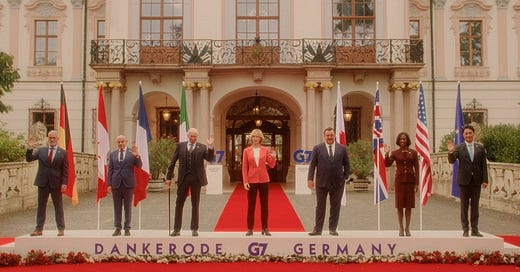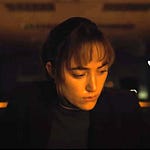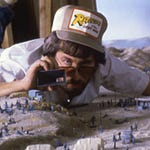Guy Maddin, director of My Winnipeg, The Saddest Music in the World, and Brand Upon the Brain is a filmmaker who seemingly operates by no rules and often merges the surreal, the traditional, and the experimental. The idea of discomfort at the merger of traditional ideas with the inexplicable, of the familiar with the bizarre, is both true of his style and also the substance of his latest film, Rumours—which he directed with Evan Johnson and Galen Johnson. Available now on video on demand, the film follows a G-7 meeting between leaders from the U.S., Canada, France, Germany, Italy, Japan, and the U.K in the midst of an apocalyptic event that leaves them alone in the woods, having to fend for themselves without any of their systems of support. This week's show is a conversation with Maddin about both the construction of the movie but also its context as an artifact of a world in transition, whether its leaders want to admit it or not.
Keep the conversation going in the comments. Follow The Entertainment on Facebook, Instagram, or Substack and let us know what you think. Subscribe on your favorite podcast app and we’d love it if you gave us a review. The Entertainment is a production of KIOS 91.5 FM Omaha Public Radio. It is produced and edited by Courtney Bierman. Our artwork was created by Topher Booth. Thank you for listening.
TK: So we're recording this hours after news that David Lynch has just passed away. And it seems like maybe we should acknowledge that. It can be in some way a segue as we get into some of the absurdism of your career and of Rumours in particular.
GM: Man, I'm really bummed out that he died. You know, I've never met him. I don't know him. It feels like I knew him because his work really got inside my head. So, I'm more saddened by the loss of what's just a celebrity. Although he was dear friends with Isabella Rossellini, who's a dear friend of mine, and so I have to send out condolences to her.
No, he was everything. He's the reason I picked up a camera when I first saw Eraserhead, which the people I went to see it with felt was just strange, even infuriatingly strange. But I felt Lynch had made a movie about me. Like Lynch, I'd had an unplanned pregnancy and sort of rushed marriage early in my adult life. I never really recovered from the shock of life changing, from the ground shifting beneath me so much. And I couldn't believe that he'd made a movie about this delirious experience.
And then, of course, Alan Splet's sound design, which he used so much in his early films, and then later a version of it throughout his career. I don't know, somehow that cut a shortcut into my subconscious. When I first saw Eraserhead, I was maybe 24 years old, and I just didn't know you could make movies about that subject, about anything other than conventional Hollywood movies. And then all of a sudden I realized I had some subjects myself—that, if Lynch could do this, maybe I could at least start daydreaming plausibly about making movies myself.
And so he's the reason I'm on your show.
It's interesting because people are talking a lot about him as someone who's wildly influential. And I think that's true, and yet, I don't know if people emulate him or can emulate him or when they try, you know? You just can't quite be on the wavelength of a guy like that. So, when you say he was part of the reason why you picked up a camera, were you ever trying to be Lynchian or was it unlocking you and the permission you needed to be you in whatever form that would take?
Yeah, I think it's more the latter. But, as it turns out, I had reasons other than Eraserhead being in black and white for making my earlier films in black and white. I just respected color palettes and their power, and I didn't want to endow—inadvertently—any one color in the frame of my films with power.
You know, the way Nicolas Roeg, in Don't Look Now, makes the color red so important? I just didn't want to accidentally change the meaning of a frame with just some color that just happened to be there. Maybe it was naïve thinking, but I decided to shoot in black and white. Jim Hoberman, who was an early, favorable reviewer of my movies, described me as a child of David Lynch at one point. And I was honored. I was not insulted because I had to admit that I guess the thing that Lynch gave me permission to do—or the thing I stole quickly from Lynch—was just making movies about the unexpressed and the kind of murky, delirious day-to-day hum that presided over my life and prevented me from waking up, totally, to my surroundings.
My father died just a few hours after I found out I was going to be a father. And that was kind of a one, two combination. I've been making films in that sort of delirious state ever since. Even our most recent film, Rumours, which is in color and has Academy Award winning actors in it speaking without any silent movie affectations or anything, was an attempt to get it airborne with the writing and the way David Lynch got me airborne in my very first viewing of Eraserhead 45 years ago.
Rumours operates on this level of absurdity that I've thought about a lot over the past several years. I talked with Tim Heidecker and he unlocked the way of framing it for me, which is that some of these things that felt surreal and absurd in art seemed like art was capturing something more absurd than realism could, but also that the world is getting weirder and dumber and we’re stuck in this mixture of stupid and hard to predict and menacing and scary all at once. And so Tim Heidecker was telling me that, when he creates the odd tone of his works, that's not really him trying to be absurd; it's him saying that real life feels this way.
It doesn't feel like there are rules. It doesn't feel like things follow, certainly, the conventions of popular art or certainly what we think of as important art. And, when he said that, I think that applies to Lynch and to your films as well. I wonder if you operate from a similar starting place—that we sort of pretend realism is the way that people actually experience things and absurdism is not, but you look at the news and you look at the things Rumours seems to be reacting to, and real life is incredibly absurd. And maybe we're fooling ourselves with our standards of what we consider realistic.
Yes. Stranger than fiction. I love Heidecker's work, all of it. I've gone to see him live, Tim and Eric Live in Toronto a couple of years ago. I just adore everything he does—On Cinema at the Cinema. It's great. Because I started out making these movies about more of an interior feeling, I knew my movies would roll out very slowly. They wouldn't have a distributor ever, I felt. But they did. I just felt they would roll out. Maybe it would take decades for people to encounter my movies. So I was very careful never to get topical with the movies.
And even as recently as Rumours, our latest film, which might seem topical because there's G7 leaders meeting and things like that, but the crisis they're addressing is never named. And I like to think that all these people would behave exactly the same way if the crisis were a volcanic eruption in Alabama or New York or a genocide anywhere. They'd be just as inert and inept and self-centered. But I'm not even really lambasting politicians, wasn't even a concern with the movie. It was more a game. I think my collaborators—Evan and Galen Johnson—and I started to think of the movie even before it got off the page and into film, planning and shooting, and more as an object than a film.
And we just wanted to construct some strange little whatnot more inspired by the writings of this American author, Donald Antrim, who wrote The Hundred Brothers and The Verificationist and Elect Mr. Robinson for a Better World. He has a premise and then he writes about it—as absurd as the premise might be. The Hundred Brothers is about a guy who has 99 brothers and he's going to meet up with all of them at the family manor for the reading of his father's will. And he just sustains this conceit. He never explains how many mothers they had or the age difference or how this was even possible. But by the time the book's finished, he's just created a world that's as varied as the real one in which we live.
And so I guess it's absurd, but it's just so well-crafted and so psychologically plausible that it feels as true to me and as absurd as the real world. I guess psychological plausibility is the important key for me in the movies. In my first movie, a short called The Dead Father—I'm well aware of the Donald Bartholomae novel by the same name, and I knew it then, but it was the only title I could give it—I was attempting to film these recurring dreams I had in which my father, who had died a few years earlier, but, hadn’t died. He had abandoned our family, and he just kept returning, usually just for a minute, just to pick up something he'd forgotten—his razor or a glass eye. He had one eye only.
And I had one minute exactly to convince him to come back and stay with his original family. And I never succeeded in convincing him. And he abandoned me over and over again every night for many, many years. And as much as the feeling of abandonment felt terrible at the end of each dream, the fact that I could only remember my father's voice and the way of moving and the way of holding his head and all sorts of other mannerisms, his presence, his clothing . . . I could only remember it exactly in these dreams. And so. Even though the feeling of rejection lingered about me till noon, over and over again—I know I sound pathologically unwell—the feeling of having just seen him earlier that morning stayed with me till noon as well. Or till mid morning anyway.
So the dreams were a real bitter mix of something wonderful, something I could cling to, and something dark. And I love that mixture and that I felt that that was what literature does. Literature can do that. It can present these hybrid feelings very deftly with just a few words. And, when I set out to make my Eraserhead, my expression of my inner landscape, I set out to recreate the feelings that those recurring dreams produced in me. I wasn't even acknowledging an outer world that much, but I do know how absurd the world can be. And thank God for the surveillance camera. That's one of the great things the internet's brought us is just actual footage of bizarre things happening.
Yeah.
Before that, I had to go to America's Funniest Home Videos.
When you think about Rumours, though, it feels very much like it's the fact of there not being an easy allegory for the crisis or the direction some of it goes from there. But it seems to me to be a reaction to the impotence of rulers, the people who ostensibly are the adults in the room of the world, right? Who think they can guide the direction of a world order that is—that they believe or have to believe is—stable, even if the world is falling apart around them. That feels very aware, on the pulse of what's happening, even if you don't make it a one-to-one allegory, like, say, Don't Look Up.
Yeah, we made a promise to each other—we tended not to explain things. There's a giant brain in the movie and we never explained it to each other. We just decided it was a good idea and we'd keep it. It was unanimous. Same with the American president having a British accent or just being British or whatever. But we never justified it to each other. In the writer's room, we promised one other thing that was pretty important: that as soon as the script accidentally started coalescing into an allegory of something, we would slam on the brakes and take a sharp U-turn and away from the allegory as quickly as possible.
We wanted to just keep the thing airborne and not give anyone the satisfaction of patting themselves on the back for agreeing with the movie, you know? For agreeing that politicians are bad or—I don’t know—that a certain viewpoint's good and a certain viewpoint's bad. This is not contempt for an audience. We didn't want people to eat poorly when watching the movie, and we didn't want them to get any of those empty calories you get from agreeing with the movie too easily. So we wanted it to be a little bit puzzling, even at the risk of being frustrating or annoying.
But once you're dealing with politicians, people start projecting things. And I'm an old surrealist, so I know that as soon as you have two or three objects that are totally unrelated to each other on screen, people start projecting connections all the time. You know, it's the old Kuleshev effect. Viewers want to make sense of a series of images, and they will, whether the sense is there or not. So, for all the U-turns we performed, probably didn't succeed completely in emptying it out.
Some people have described the movie as kind of a Night of the Living Dead riff. Without necessarily getting into the exact nature of where the turns go and some of the conflicts that come up, the idea that world leaders find themselves in a very practical, survival situation, is just a fun concept—the idea that they usually are able to delegate or are are, in their mind, able to come up with the perfect platitude and hand that off to somebody else and then all the different machinations of different countries will figure it out so long as they steer the ship in the right direction. But to actually put them in a practical situation both seems like a kind of statement about the people who run countries and also a great basis for humor.
Right. I think Viola Davis is coming out with a movie called G20. I thought, “Geez, we should have just called our movie G7 already.” But anyway, I think she plays the American president and some terrorists do something, maybe kidnap her family and she has to rescue her family while performing hosting duties of a G-20 summit. But we heard of this even before we went to camera and we were a little bit staggered by the odd coincidence—and that someone had added all those extra countries.
We couldn't afford more than nine characters, seven world leaders and a couple extra, but big budget Hollywood . . . Well, you gotta pull for Hollywood now. It's going through a rough time.
When you guys were thinking about it, though, surely there is some real reaction you have to looking at people who run countries—who have power, who are supposed to be these symbols of the average citizen in some sense—and you wonder what would happen if they had to accomplish an average citizen’s kind of task. I’ve joked before that our presidential debates might be more helpful if they were just contestants on a cooking competition show like Chopped. Like—whether they can make a pancake or not might reveal more to me than whatever speech they’ve prepared.
Yeah.
Are you having those kinds of conversations about the external state of the world as the movie is being formed? You’re not trying to make it too much of a message, but that seems like a real sentiment that is relatable to people in general who are probably frustrated in some sense with whatever power structure they live in.
I think my collaborators and I aren't very optimistic about how the world is run. And I only recently learned the term the Overton window—you know, the stuff within the Overton window is stuff that you're allowed to talk about in public discourse without sounding like a crackpot. But all of our discussions are well outside the Overton window. Now I'm out lying down on a boulevard making snow angels, talking into the air. I can't even remember the way back to the window.
I'm not all that optimistic, especially on foreign policy and stuff. And the word oligarchy is floating around a lot now. Maybe in my late period, I can get back into youthful conspiracy theories. But we really wanted to make something that was just apolitical and just leaders. It tends to be that most leaders that show up at G7 summits tend to be centrist or right of center, anyway. It's not like there's a full spectrum of ideologies. It's not like many Marxists show up at these things. And, you know, they all have their world, their solutions, which involve just making the rich richer.
So, I don't know. I don't want to sound like some commie Canadian.
A through line to where we started can be: I think, generally, art tends to treat leaders—or popular art anyway, the kind of stuff that tends to have a lot of prestige—tends to lean on respect or reverence or intelligence or depth, rooted in this idea that leaders are either good people or tragic figures, complicated in all kinds of ways. But Rumours or, what may be its precursors like Dr. Strangelove or other absurdist earlier works, don’t feel the need to put this respect and depth into these characters. They can be goofy in that sense. Empty.
And that vapid quality doesn’t have to follow the rules of how cultures feel like they have to respect their power structures. And that feels like a healthy way for people to engage with frustration that isn’t putting faith in the Aaron Sorkin philosophy of “We’ll get the right speech delivered to this complicated person that will lead to the solution of this problem.” The frustrations here in Rumours are more in the nature of: the problem is probably not going to get solved and we can sort of just enjoy the crash of how that manifests.
I can't express enough how much I love Dr. Strangelove. It achieves everything. You know, the George C. Scott general is fresh from his mistress's bed. And everyone's very human and ridiculous. And but the stakes are so high in the atmosphere. That thing's just a unit—like one strangelove, a unit with enormous power. It should be on the periodic table or something as one of the heaviest and most volatile things. I also saw—a really late viewing first experience—The Manchurian Candidate properly recently and was really knocked out by that. I thought that was great, too, in a different way.
However, every now and then, if I watch a movie, if it's directed and written properly, I'll buy into things that I don't really believe. Like I'll buy into the myths of the American dream as long as it's well written and Henry Fonda's delivering the monologue or something like that. I'll just buy totally into it. So, it's not like I'm sitting here all cynical or anything. And I'll be moved to tears. I just finished watching Fonda's first movie the other night, The Farmer Takes a Wife. You have him and Janet Gaynor, and he delivers a little monologue about American soil and it’s unbelievable. I was weeping. I’m Canadian, you know, and I’m not a farmer.
So, it’s all in how it’s written and performed. It’s art, after all. And it’s not propaganda. There’s just an expression of the human soul, the director and the artists involved in the film. Rumours? I don’t know how emotional it is. I feel very stirred by the ending. And here I am talking about a movie I had a hand in making. But I feel very stirred by the utter desperate emptiness of the ending delivered with such rousing joy, adrenallated anti-patriotism, somehow. It actually gives me goosebumps. It makes me want to cry. And nothing I’ve ever had anything to do with making myself—my name’s on there as one of the directors—has done that for me.
And I feel good about it, even though it's kind of an anti-emotional thing. I defy you not to be stirred by the ending of that film of Rumours.
For it to stir you that much, was that something that was clear when you were coming up with it, when you were writing it? Or is it something that developed as it came together?
We discussed the story often, and then Evan Johnson went into some sort of flow state—he can speak this geopolitical gibberish fluently,like an interpreter at the UN—and he wrote the script very quickly and I was scared. We started talking about editing it and fixing it up and giving it a structure. And I was going, “No, this thing is like editing an iridescent soap bubble.” You can't do it; you just don't touch it. And so we left it alone for about three weeks. And then we realized it really was sort of abandoned before it ended.
And we thought of an ending and added it, but we didn't go back and change much of anything earlier on, because I felt that this beautiful bubble got airborne and stayed there. But this ending? We knew it was just intentionally stirring. Film directors have some tools in their arsenal, like music and rhetoric and performance, but the words really are intentionally empty or personal to the point where they'd be of no use to anyone in the world. And he has an audience of one, basically. I just liked all the different tensions going on there. So we had the help of, you know, cinematic, vocabulary backing, an incredibly dynamic performance of Respighi’s “Pines of Rome,” and a great performance from a rhetorical performance from Roy Dupuis, our Canadian prime minister in the film, and a lot of callbacks to moments earlier in the film that are now recontextualized in this speech but still add up to nothing.
The fact that I was moved at my own movie, which sounds really arrogant—and I'm saying it sheepishly—I think I was moved by the power of cinema to summon powerful moments almost out of nothing somehow. So maybe that moved me. Maybe that's an insider emotional enjoyment.
Are the politicians’ tools so different from the filmmakers’? This idea of rhetoric, this idea of employing your music as you go out for a speech, the choreography of how it is all laid out visually—that is doing a lot of work beyond just a person going out and baring his soul. Are you tapping into something in that the politician is able to do that, to be both powerful and add up to nothing?
You know, that's a very smart observation. And I can't remember because the three of us write like people hardly aware that they have their fingers on a Ouija board. But I think, whatever it is, I'll take it as intentional. But it’s well observed that everything I just said about that speech at the end also describes almost every political speech ever given, except maybe some during World War II. Or maybe even more so during World War II. But, yeah, it’s the same thing. They’ve got the same tricks and they’re in the same bags.
Do you get stirred by political speeches?
I remember when I was a young adult reading Lincoln's speeches and being quite stirred. Of course, Martin Luther King's were amazing. As I got older, I realized what the true intent of speech is. So even when Kennedy's talking about his promise to get to the moon, you realize later that it was just a propaganda part of the Cold War. You start realizing the motives behind the speeches and you get a little more skeptical and you're less stirred. Even when Obama was leaving office, he had a little surprise ceremony for Joe Biden, saying goodbye maybe to public life forever as the vice president, and I remember tearing up over that even for some reason.
But, oh, he returned to earn his war criminal credentials or whatever since then. But, yeah, I'm stirred as anybody. I'll weep over a Cecil B. DeMille monologue by John Wayne in Reap the Wild Wind. Yeah, I'm easily stirred. It wrings me out sometimes.
When you were telling your story about the Henry Fonda monologue and if that kind of emotion that you maybe don't intellectually relate to that much, but if it's presented the right way, it still can land for you with that punch, and, if politics is trying to do that the same way, the politics in Rumours are not trying to add up to much even while the performances can be stirring. But a movie, particularly one about politics, will almost always try to add up to more than just a performance, but to leave it there . . . I can’t think of a similar example.
Well, thanks. I guess I'd enjoy more political speeches if I didn't have contempt for almost all politicians. We started writing the script with contempt for everybody, but that's no way to write a script. And as you start collecting characteristics for each one of your characters, you end up kind of rooting for them or liking them or understanding them a little bit. Or you base some of their traits on friends you have forgotten from long ago. And, I don't know, by the end of the movie, you know who each of these characters is and you have some affection for them and you end up kind of liking them, even though in real life they'd all be subject to indictment under the Geneva Convention or whatever.
But they end up being likable schmucks at an outing. It's kind of like one of those all-in-one-night movies like Dazed and Confused or American Graffiti where a bunch of friends are getting together and wandering around and having adventures. Whether you like some characters more than others—and they don't all like each other—there's a real shared experience of one evening that feels really good. And it's usually a callback to if you've been lucky enough to have a night like that in your youth. Or, in my case, I extended my youth well into my late 30s and 40s. I was having enchanted evenings like that all the time where I’d just stay out and where all the rules of the world seemed suspended for one enchanted night and the temperature rose to a perfect temperature and things just happened. More things happened per moment than anything else.
And so, we were thinking, to prep for the movie, instead of watching Dr. Strangelove, we watched Dazed and Confused. And we also watched The Exterminating Angel by Luis Buñuel, where a dinner party of about 20 people, once they’ve finished dinner, can’t leave for no explicable reason. They’re unable to leave the dining room. And I just love the bold premise of that movie. Buñuel is amazing. He’s my god. I guess Buñuel and Lynch would be my two gods, both gone now.
I do feel like there's a sense that among the political class or the people who are really into politics, the Aaron Sorkin type of artists as well, that, if you do come up with the perfect speech, you can save the world. And as we've said, the perfect speech can still be stirring, but I don't know that there is as much faith in that idea right now even. And to not have to parody the specific issue, not totally have to satirize the specific people, but just that concept alone is itself maybe reflective of the current moment.
Even though we designed the movie to be kind of timelessly timeless—avoiding anything 2024-specific—it really does feel of the moment and I was really pleased with the level of comedic performances that the cast found in rehearsal and then just on the set. When they all convened in Hungary for the shoot and we introduced all the actors to each other, none of them had met before. They finally scrounged up the courage to say, “Just what is this, anyway? What is this script?” Some of them were swearing. “What the F is this script?” And we just said, “Treat it as seriously as possible.” But then it’s impossible to treat really seriously. And so I was especially pleased with the way Cate Blanchett set the tone.
She’s the only actor that had to use an accent other than her own, because all the other world leaders hail from the countries they’re representing or have the appropriate accents. And, if you adopt an accent that’s too dead serious, you could really bring the material down. And I just noticed that the bigger, more heavily accented she was, the funnier the lines of dialogue were. She needed that accent to go in and detail each comic syllable somehow. She tried it a number of different ways in rehearsal—light accent, heavier, whatever. Luckily, her best friend, Bina Daigeler—the costume designer for the film—has a perfect German accent for her.
And she just, the genius that Cate Blanchett is, just stole her best friend's accent.
I love the detail that they generally take things seriously, but there's kind of a logic of what actually shocks them in the moment and what doesn't. And so things like the giant brain not being as shocking as there not being anyone to refill their wine glass was particularly funny to me.
There's a line that Roy Dupuis, the Canadian prime minister, has when he's describing Alicia Vikander's character, saying “I found her huddled up next to a giant brain.” He doesn't say “Next to this strange, giant brain” or “There's this weird, giant brain and this is where I found her.” There’s a weird, slightly stilted, written way of speaking that comes up now and then that’s very pleasant to my ear. It’s got its own style, and I’m very pleased with how the actors attacked it.
The giant brain . . . I know you said you didn't want it to have any particular meaning necessarily. But, again, if we're looking from a fairly cynical standpoint—to have seven world leaders in search of a brain of some sort—felt like kind of a starting place for me that they don't have what it takes to sort of solve these problems. That, if they did find a brain that would be maybe useful, although they don't really stick with the brain, they don't find much use with it.
Yeah, that's pretty good. That's good enough for me. Other people have had some interpretations. They all kind of fit, more or less. I wanted it implied that it was a giant brain from maybe some pagan times, but maybe it might even be alien or just some sort of a cult thing. I guess there is always the possibility it was alien. The result of protesters planting a giant foam rubber brain in a forest just to spook the world leaders. Like I've said, this isn't a spoiler. It's never explained in there. But there is sort of a one-size-fits-all use there for the brain.
I know when I was a kid, I thought all world leaders must've been really smart, that they’d have to be, that they knew far more than mere mortals. And then, I don't know, just the idea of, of a giant brain is nonverbal as an idea. It's just something you see. And it's assimilated into the story through Alicia Vikander's character, serves its purpose, and then leaves—exits stage left. It's fine enough for me.
So you used to have that sense that the world leaders were smart, on the superhuman level. Was that a slow chipping away or a moment when you started to become disillusioned with the brains of the people in charge?
It was slow to go away. And I'm not saying I have the right take, but I was 12 in 1968, that unbelievably tumultuous election year with assassinations and riots, and I remember Gore Vidal and William F. Buckley had a series of debates on TV. I watched them as a 12-year-old; I didn't understand everything they were arguing about. But they argued a lot. And I really believe that the idea of a debate was for you to convince your opponent of your viewpoint and that you won the debate once you convinced your opponent of your viewpoint. Then the debate was over and you were declared the victor, but I was really disappointed.
I think, in the next election cycle, I watched the presidential debate or some prime ministerial debates up here, and I realized there's just a bunch of people yelling their viewpoints over top of each other and making no attempt to convince each other of anything. And, half the time, they didn't even believe their own viewpoints—I found out years later, anyway. I'm still extra cynical about that now. Ronald Reagan, before he realized it was advantageous to be evangelical, was very progressive about some things. He was pro-choice, that sort of thing. So you just adopt certain viewpoints for political reasons. And it was a crushing disappointment to me that the whole idea of debate for the good of everybody didn’t exist, and then, yes, a gradual erosion of my faith in anything existing for good reasons disappeared as well.
I've got a weird obsession with the Buckley/Vidal debates. I’m sure I’d seen references to it but I didn’t watch them until I saw that Morgan Neville movie Best of Enemies. Since then, I’ve watched the full debates, I’ve read a lot of these guys’ books, essays, and, in my own political disillusionment, I can both agree completely with your point and yet I can’t help myself from being totally entertained by these two guys poking each other until Buckley explodes. It’s not healthy, but it’s kind of fascinating in its own right. And that is, in some sense, what most politics has become.
Yeah, you’re right. It's kind of like a prototype of what CNN turned journalism into, you know, just entertainment. Or what 60 Minutes is often now blamed for, not just delivering the news but being entertaining as well. And you throw Norman Mailer in there now and then.
Right.
It's entertaining and completely unproductive, just provocative and entertaining.
Internally, as an artist do you feel good about Rumours about how it turned out and what you were able to achieve with it?
Oh, yeah, absolutely. It’s a strange little object. In my dreams, it’s delightful and it’s a bit puzzling and you have to look at it from a few different sides before deciding whether you’re interested in it or what it might be. But I hope while viewers are watching it, they’re really delighted. I think there’s some beautiful performances in it by all the characters, all of them, and some really strange writing. I think the laughs come from really odd places. And so it’s only distantly related to the patriarch we discussed at the top of the show, David Lynch, but I like to think he would have liked it.
I often think of the American poet John Ashbery, who’s a big surrealist, but a big fan of Raymond Roussel, a French writer who defies characterization. And I like to think he would have been delighted by it as well. So, writing for these people and directing for these people, and then just hoping, and then writing for the drawer or writing for the archive shelf and hoping that future audiences will really be grateful this thing exists . . .
I can’t believe I’m speaking this way because it doesn’t sound very modest, but these are my hopes. These aren’t my beliefs. They’re my hopes that people will really like the movie.













Share this post